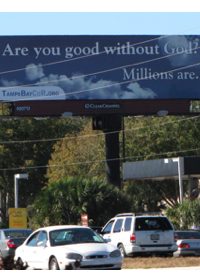
The Tampa Bay area of Florida may be the unfortunate site of the looming apocalypse, as local Christians and atheists battle over billboard space. Six months ago, a retired businessman paid $50,000 to rent 10 billboards that condemned the separation of church and state. In retaliation, the United Coalition of Reason has spent $100,000 to erect signs that read, “Are you good without God? Millions are.”
National director of the United Coalition of Reason, Fred Edwords, intends to plaster the anti-God billboards all over the nation, on bus shelters, billboards, and transit stations. He claims that he has been greeted by positive reactions to the signs. “People are saying, ‘Geez, where have you been all my life? I didn’t know you existed. I thought I was the only one who thought this way.’”
Despite these alleged encounters, 84 percent of the Tampa Bay area is Christian, and another 5 percent are either Jewish or Muslim believers in God. Seemingly, 90 percent of Tampa Bay would disagree with the coalitions’ billboards.
The coalition asserts that it is their goal to bring nonbelievers together and increase the visibility of local Community of Reason societies, specifically the Tampa Bay Coalition that recently opened. They collect information from atheists, secularists, and humanists and bring them together in one place. It also provides training for web hosting and public relations, presumably to arm the members with the proper ammunition to get the “word” out. No group has ever made such an effort to articulate that which they don’t believe.
In response, activist Terry Kemple, whose group was behind the 10 Christian billboards, criticized the United Coalition of Reason as “not having very much reason.” Kemple’s signs have decorated some of the busiest highways in the Tampa area. One billboard quotes George Washington as saying, “Reason and experience both forbid us to expect that national morality can prevail in exclusion of religious principle.”
Kemple argues, “It flies in the face of rationality to believe that we can live in this complex world we live in and not have some master designer who created it. [But] we live in America. It’s their privilege to put up inaccurate information.” To the dismay of many travelers, the two new anti-God billboards will remain up until February 25 and are expected to be seen by approximately 35,000 people a day.
Evidently, the attack on Christians is not limited to the Tampa Bay area. In fact, the atheistic signs originated in the northeast and have since adorned highways in Texas, Arizona, Colorado, California, and countless other areas. Such signs read: “Being a good person doesn’t require God. Don’t believe in God? You’re NOT alone!”
Numerous godless billboards throughout the country have been defaced in retaliation. Likewise, in Cincinnati, Ohio, threats prompted the property owner to remove an atheistic sign only two days after it was put up.
In contrast to its anti-religious sentiments, the atheist movement has ironically morphed into a religion of sorts. It has erected foundations, staged marches, and planned retreats — all in the name of … nothing.




